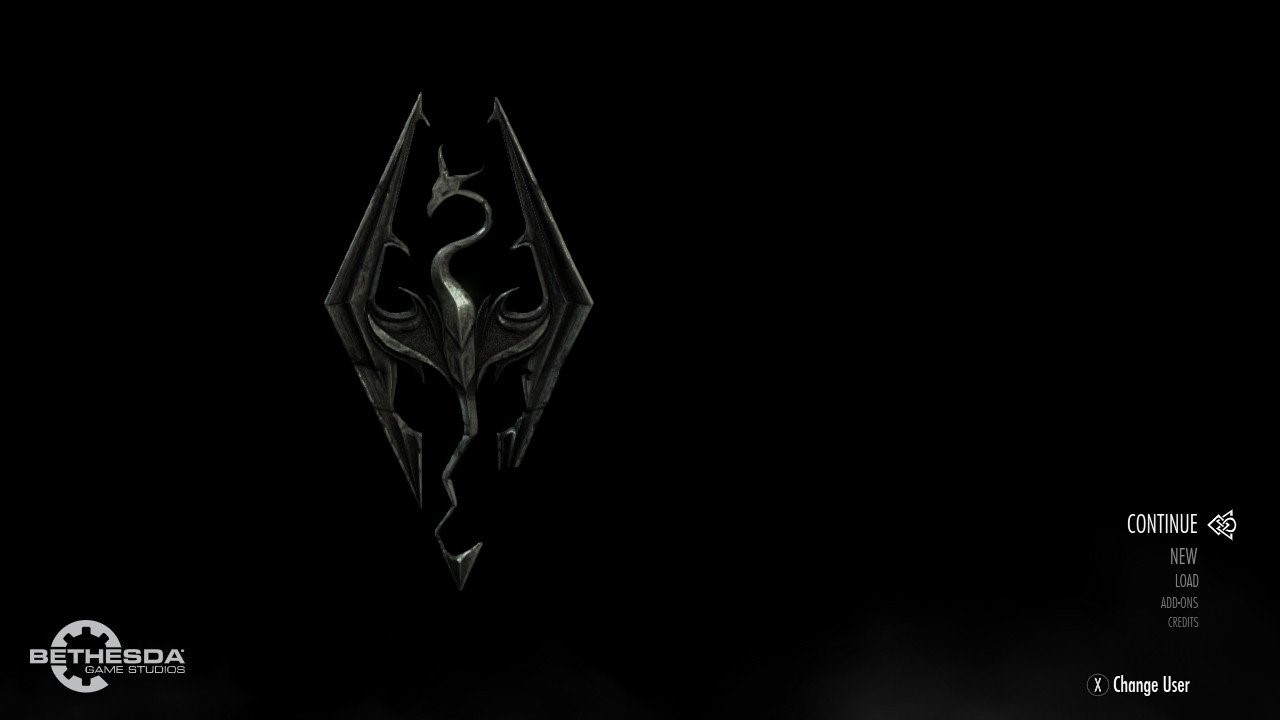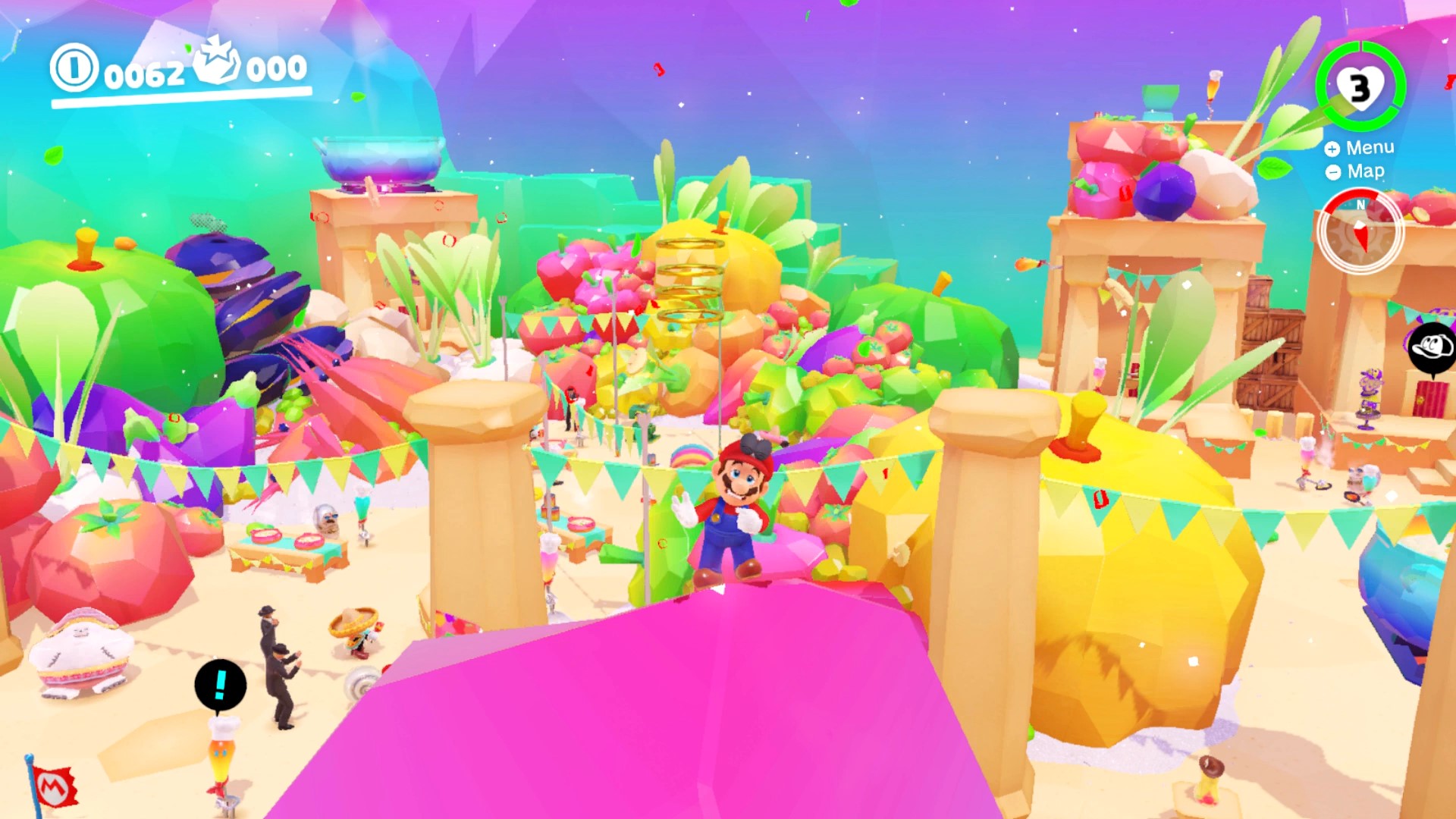The Elder Scrolls V: Skyrim
FUS-TRA-TING
From its initial release in 2011 to its Switch port in 2017, the Elder Scrolls V: Skyrim has outlived the Wii U’s production run. You can take that as a compliment to Skyrim’s enduring appeal or a sad reminder that Nintendo’s last generation console was an infertile wasteland of sadness and solitude. Skyrim has received a fair amount of flak for its endless ports, and with each edition, reviewers have collectively shrugged their shoulders and stated, “It’s still good.” Being a Nintendo-only gamer/fungus, I was one of 25-or-so hermits that was looking forward to playing Skyrim for the first time, so I was eager for the port. At long last, people would shut up about how I was missing out on one of the greatest games of all time.
Six years of hype creates a damningly high expectation to surpass, but it is not uncommon for a game to prove itself to be a timeless gem. In a sense, Skyrim is one of those gems, but whereas Ocarina of Time is a diamond, the fifth rendition of the Elder Scrolls is a just a humble pearl. I imagine a dose of nostalgia would have sedated many of my frustrations with the game, but without that, each glitch, repetitive side quest, and instakill jangled my nerves. What once was a Game of the Year now feels like a mere stepping stone for a later, better Elder Scrolls sequel.

Solomon’s best attempt to capture a scenic picture.
What is it?
Skyrim is Dungeons and Dragons watered down to an action RPG for the cool kids. From the outset, your character is set to be executed despite no one knowing what you did because, hell, they had to find some way to start the story, didn’t they? A dragon soon crashes the death party, allowing you to escape and explore the vast region of Skyrim. As luck would have it, you happen to be Dragonborn, an individual who can use the magical shouts of the dragons and suck out their souls. With this power, you can not only end Skyrim’s current civil war but rebel against the dragon menace that threatens civilization’s existence. You can also screw that nonsense and busy yourself with fetch quests, building a house, and other matters far more important than war and mass extinction.
As you can tell so far, Skyrim allows you to sculpt your play experience as you see fit. You select your character from a number of different races (each with different abilities), design their physical appearance, and then name them. From there, you choose how you fight, be it with magic, melee weapons, bows, sneaky-sneaky daggers, or a combination of the above. Each of your hands can hold a weapon/spell, so there is a lot of mixing and matching if you so choose. Forget any hopes of addressing conflict nonviolently because bloodshed is the universal language in Tamriel.

The most holy of all the weapons: the floating iron sword.
Almost every action you take builds experience. Sling a few fireballs, and your destruction level will improve. Pick a few locks, and bam, level up for lock-picking. Sell a few iron swords? Sure, that’s reason enough to up your speech level. Skyrim follows the logic that if you do the same thing enough times, you’ll improve. Prepare enough ramen noodles, and one day, you, too, can make peppercorn-crusted filet mignon. As you grind your individual abilities’ levels, they contribute to an overall experience meter, and once filled, you can upgrade your magic, health, or stamina in addition to allocating a skill point to further buff your skills.
Although the civil war and dragon storylines are the main focus of Skyrim, you have several other opportunities to dive into the Elder Scrolls lore. Each major town has at least one substantial quest, be it to climb the ranks of the Thieves Guild, eradicate the vampire threat or join them, or confront one of the many Daedric (demon-like) princes. Countless smaller quests can be attained from speaking to townsfolk or other NPCs. The large majority of all quests will task you to delve into a dungeon, cave, or fortress infested with hostile EXP livestock. Should you accomplish your missions, all the NPCs of the land will recall your deeds forever and always, mainly because they have few dialogue options.

Even Agnes – who is forever stuck in the wall – will herald you.
What’s good?
- Skyrim is immersive because of how much control you have over the game world. You can align with certain factions and rout others, betraying those who you dislike. You can read through the multitude of books littered throughout the land, learning everything you could have discovered from the Wiki. If you wish to be self-sufficient, you can craft all of your materials through alchemy, smithing, and enchanting. Hell, you can even marry and adopt kids. With this virtual autonomy, the real world is simply a vestigial appendage of your mortal coil.
- The amount of content can easily suck out a hundred hours from your life. The number of quests in the original game is staggering enough to topple a large class of fifth graders, and this is further bolstered by the included Dawnguard, Hearthfire, and Dragonborn expansions. Multiple playthroughs are encouraged to try out other character races and follow different questlines (such as choosing to become a werewolf). There is a lot to do, even if a quarter of your playtime is spent on loading screens and small talk with the locals.
- Certain quests ooze with creativity. The civil war quests see you fighting alongside an army while conquering enemy fortresses or cities. You can join the Dark Brotherhood (a league of assassins) or opt to eradicate them. You can enjoy a night of drunken debauchery and suffer the next day with a hangover and the unsettling fact that you proposed to a hagraven. The Daedric prince quests, in general, offer adventures that can be unsettling, epic, and/or hallucinogenic.

Nazir was so amazed by Solomon’s archery that he refused to move as Solomon shot arrow after arrow into his face.
What’s bad?
- Bethesda produced a lazy port. Upon its initial release, Skyrim was riddled with more bugs than a Riften vagrant, but this was supposedly forgiven due to the massive scope of the game. However, six years later, Bethesda has done nothing to reduce the pests. Entire questlines cannot be completed; enemies flip and fly through the air; crashes occur; and controls can be unresponsive. Apart from the bugs, the only new additions to this Switch edition are botched motion controls and free items from amiibo.
- Combat often feels more like a battle of attrition than technique. Most fights boil down to who whacks who harder. Dodging and blocking are too inconsistent to be reliable, so you will often spam the attack button until you run low on magic, health, or stamina. At this point, you flee the battle or to your menu to guzzle eight potions or devour eighteen sacks of flour. Hit detection is variable but particularly horrendous against dragons or when using a bow. Some scuffles can be fun, but the combat system does not feature the depth needed to keep it entertaining over hundreds of hours of content.
- Much like the life of an NPC, Skyrim becomes numbingly repetitive, contrary to my opinion in my padding blogitorial. It’s great that the game has fifty billion caves, dungeons, ruins, and fortresses, but when they all follow the same basic archetypes, it’s hard to distinguish between Location 23 and Locations 46, 72, 138, or 95b. It certainly doesn’t help that you’re constantly fighting the same spiders, bandits, and goddamn Draugrs. Even dragons eventually devolve into annoying houseflies, albeit big, burny ones. I get that some things will repeat in a massive game, but Skyrim often feels like the product of one designer/programmer falling asleep on the Ctrl+V buttons.

The best bug was when Solomon’s magic meter never diminished. Ungodly power, I tell you.
What’s the verdict?
Skyrim slammed the gaming world like a comet in 2011, blowing away all other releases and distinguishing itself as a game to be remembered. In the years since, Bethesda has tried its damn hardest to make sure we won’t forget it either. In reviewing this game, I haven’t a clue if I’m biased due to my unrealistic expectations or if everyone else is due to their nostalgia-addled brains. New players will likely get a kick out of the freedom offered by the Elder Scrolls, but veterans need not slog through the same game they have been force-fed for years. For any of my readers on the fence, you can wait and make your decision when I repost this review in two years for the Elder Scrolls V: Skyrim – Anniversary Edition – Pocket Edition.
Arbitrary Statistics:
- Score: 7.5
- Time Played: Over 75 hours
- Number of Players: 1
- Games Like It on Switch: The Legend of Zelda: Breath of the Wild, Xenoblade Chronicles 2












